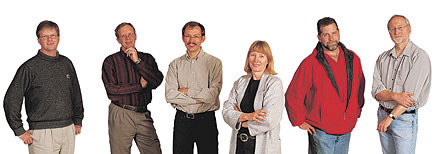


Glycoscience —
Biology's Newest
Unchartered Frontier
by Kathleen Cason
Intro | Part two | Part three

![]()
Intro
Like wallflowers at the homecoming dance, complex carbohydrates used to attract few suitors. In the
world of giant biological molecules, their sexier cousins — DNA and proteins — commanded the
most attention.
But over the past decade, the wallflowers have bloomed and scientists are hastening to uncover
their secrets. And researchers at UGA’s Complex Carbohydrate Research Center are helping lead the
way.
Complex carbohydrates are the next frontier in understanding the secret molecular messages that
rule the life of our cells. These strings and branching “trees” of sugars have eluded study and
their roles have long been neglected. But during the past two decades evidence has been mounting
that these macromolecules deserve attention: Carbohydrates determine blood type, regulate plant
growth, and even have roles in cancer, diabetes and human development.
For all cells — plant, microbe and animal — a sugar coating is at the cell’s outer perimeter. It’s
what an invader first encounters; it’s what other cells touch. In it resides information that
identifies the cell — this one’s a liver cell, that one a skin cell. It may glue similar cells
together or unglue cancer cells, allowing them to break loose and travel throughout the body. When
invader molecules from a virus, bacterium or fungus touch the outer perimeter, they may trigger
self-defense mechanisms in plants or provoke immune responses in animals.
For several decades, CCRC researchers have been on the forefront of glycoscience (“glyco” means
sugar). They not only study normal growth and development in plants and animals but also
investigate disease processes. When tools did not exist to answer their research questions, CCRC
scientists developed new ones. The methods they’ve developed are fueling plant and medical
carbohydrate research, not just at the CCRC but worldwide.
“The biology is hard, the chemistry is hard, everything is hard,” said Gerald Hart, a CCRC adviser
from Johns Hopkins University School of Medicine. “In glycobiology, in terms of understanding and
technology, we’re back where DNA and proteins were in the 1960s. There’s been a lot of progress in
the past 10 years but we have a long way to go.”
The following is a snapshot of current research areas and the faculty pioneering glycoscience at
the University of Georgia.
![]()
![]()
![]()
![]()

![]()
![]()

![]()
![]()
![]()
![]()
If your browser does not support rollovers, please see the text version.
Intro | Part two | Part three
For comments or for information please e-mail the editor: jbp@ovpr.uga.edu
To contact the webmaster please email: ovprweb@uga.edu
![]()